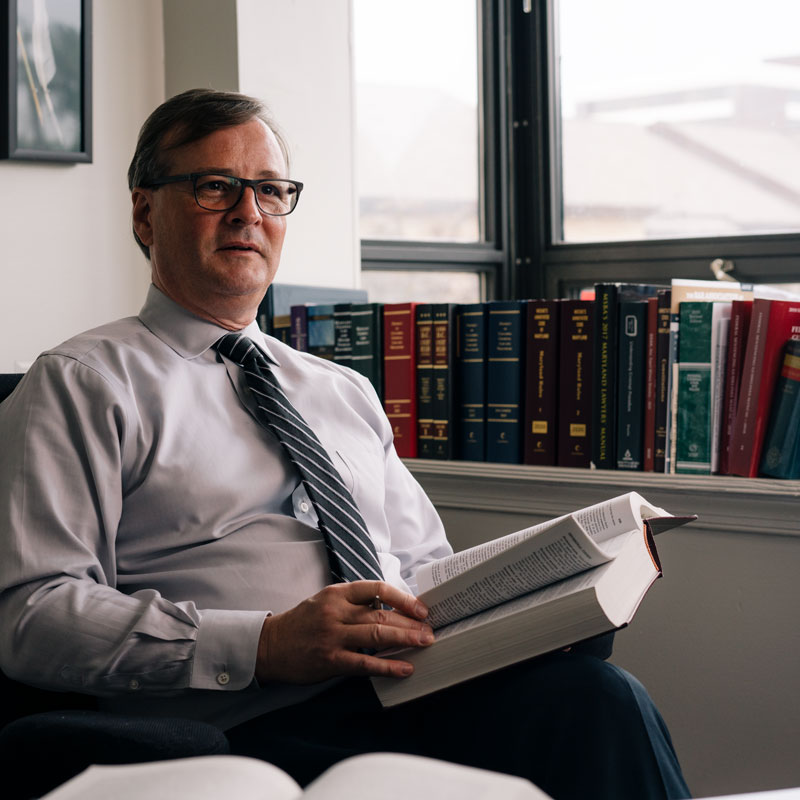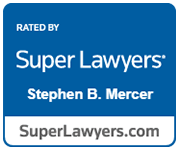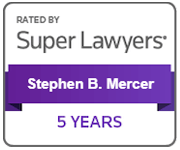

Practice Areas:
- Criminal
- Civil Litigation
- Appeals and Post-Conviction
Education
- District of Columbia School of Law, Washington, District of Columbia
- 1994
- Syracuse University, Syracuse, New York
- 1984
Bar Admissions
- Maryland, 1995
- District of Columbia, 1997
Published Works
- A Critical Account of the Raines Decision for Maryland Practitioners, Maryland’s DNA Databank, Md. B.J. 17, November/December, 2004
- Shadow Dwellers: The Underregulated World of State and Local DNA Databases, 69 N.Y.U. Ann. Surv. Am. L. 639, 2014
Representative Cases
- Maryland v. Raines
- Maryland v. King
- Horridge v. Dept. of Social Services
- Derr v. State (I & II)
- Argueta v. State
- Neustadter v. Holy Cross Hospital
Pro-Bono Activities
- State of Maryland, Education, Ethics, and Terminology (EET) Interagency Working Group, 2011 - 2012
- Pro Bono Public Award, Whitman Walker Clinic, Washington, DC


Biography
Steve Mercer is a practicing lawyer in Maryland (1995) and the District of Columbia (1997). Steve’s experience and expertise focus on the use of scientific evidence in criminal and civil litigation. Steve is considered one of the nation’s top attorneys on the subject of complex mixtures of touch DNA. Steve has over two decades of trial, appellate, and post-conviction experience, primarily in private practice. Also, from 2010 to 2017, Steve was the Chief Attorney of the Forensics Division of the Maryland Office of the Public Defender, nationally recognized as a model of excellence in forensic science litigation. Steve’s litigation highlights include challenges to a wide range of DNA/forensic science disciplines, from complex mixtures of touch DNA, presumptive serological and drug tests, microscopic hair comparison, synthetic fiber comparison, cell phone tracking, “shaken baby” child abuse, and many others. Significantly, the scope of Steve’s experience extends beyond a challenge to the methodology at issue to include assessing every avenue of litigation to block or neutralize DNA/forensic science evidence. Because of his experience, Steve can anticipate, identify and litigate novel issues about the collection, retention and use of DNA/forensic science evidence that other lawyers won’t spot. In a ground-breaking case, Steve litigated in 2002 the first constitutional challenge to Maryland’s DNA collection statute, (Maryland v. Raines) which laid the groundwork for his later representation of a client before the United States Supreme Court in a case which one justice described as “perhaps the most important criminal procedure case that this Court has heard in decades.” (Maryland v. King). Steve is widely recognized in Maryland trial and appellate courts for his DNA/forensic science litigation.
Steve is also actively involved in criminal justice reform legislation, education, and public commentary on issues involving the reliability of forensic science and the impact of technology on civil liberties. Steve led the successful effort before the Maryland General Assembly in 2019 to enact a technical corrections bill for the Justice Reinvestment Act that allowed inmates sentenced for violations of probation to receive more generous diminution credits. Steve also led the successful effort before the General Assembly and the D.C. Council to ban familial searching of DNA data banks. He is a frequent speaker at DNA trainings for judges, prosecutors, defense attorneys, and laboratory analysts. Steve is passionate about the particular issues related to DNA mixtures, touch DNA, the continued expansion of law enforcement DNA databanks, and emerging law enforcement techniques such as using the similarities of DNA between related persons to identify family members of individuals in a DNA databank. His views are often discussed and debated in national news media. Steve’s media highlights include his appearance on CBS’s Sixty Minutes newsmagazine program in a segment that focused on the emerging practice of “familial” and kinship searching of DNA databanks. Steve has also been featured on the topic of familial DNA searching of databanks in numerous other media outlets such as HBO Vice, the PBS program, Religion and Ethics News Weekly, MSNBC and ABC News. Also featured in the media are Steve’s efforts to draw attention to the emerging practice of law enforcement to operate unregulated DNA databanks containing DNA of crime victims and innocent people. Steve has addressed by invitation the Maryland Judicial Training Institute on the topic of complex mixtures of touch DNA, the FBI’s national CODIS symposium on the privacy and racial justice implications of familial searching of DNA databanks, and addressed these same topics before the American Academy of Forensic Sciences, and the National Institute of Justice. In 2016, Steve addressed by invitation the United States President’s Council of Advisors on Science and Technology (PCAST) on issues related to the use of scientific evidence in criminal trials. Steve is committed to meaningful reforms of DNA/forensic science disciplines. In 2011 Governor Martin O’Malley appointed Steve to represent the State of Maryland on the Education, Ethics, and Terminology (EET) Interagency Working Group, established to support the Subcommittee on Forensic Sciences, (SoFS) and the Executive Office of the President on policies, procedures, and plans related to forensic science at the local, state and federal levels. Steve’s publications include a critical account of the Raines decision for Maryland practitioners, Maryland’s DNA Databank, Nov./Dec. 2004 Md. B.J. 17 and a law review article on local DNA databanking practices, Shadow Dwellers: The Underregulated World of State and Local DNA Databases 69 N.Y.U. Ann. Surv. Am. L. 639 (2014). Steve is an Adjunct Professor at the David A. Clarke School of Law, where he teaches an advanced evidence class on scientific evidence. Connect with Steve on LinkedIn.
Steve is a member of the American Academy of Forensic Sciences, Maryland State Bar Association, the American Bar Association, the National Association of Criminal Defense Attorneys, the Maryland Criminal Defense Attorney Association, the Montgomery County Bar Association, and the Prince George's County Bar Association.
Classes & Seminars
- Complex Mixtures of Touch DNA, Maryland Judicial Training Institute
- Privacy and Racial Justice Implications of Familial Searching of DNA Databanks, FBI’s National CODIS symposium
- Privacy and Racial Justice Implications of Familial Searching of DNA Databanks, American Academy of Forensic Sciences
- Privacy and Racial Justice Implications of Familial Searching of DNA Databanks, National Institute of Justice
- Use of Scientific Evidence in Criminal Trials, United States President’s Council of Advisors on Science and Technology (PCAST), 2016 - 2016
- Adjunct Professor, Scientific Evidence, David A. Clarke School of Law
